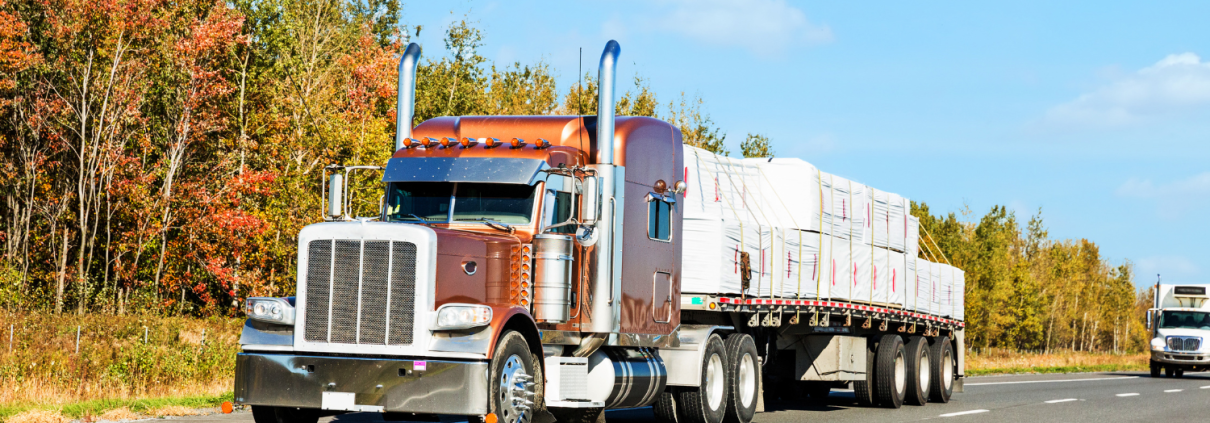
Considering a career as a flatbed trucker?
Calling for a specialized set of skills, daily attention to detail, and physical strength, flatbed trucking is an in-demand job that comes with high risks and high rewards.
However, before making any decisions, it is important to understand the full expectations, challenges, and advantages of being a flatbed trucker. Keep reading to learn what flatbed trucking really is, and you can decide if this is the right career choice for you.
A Day in the Life
A flatbed truck is a large commercial vehicle with an entirely flat and level “bed” or trailer. This differs from a traditional tractor-trailer because there are no sides or roof on the trailer. Flatbed trucks are typically used to transport oversized, bulky, or abnormal loads that are not delicate or vulnerable to weather.
While this open-top design allows for quick and easy loading and unloading, flatbed trucks also require proper load securement every run to prevent potentially dangerous accidents in transit.
In fact, since 2002, the Federal Motor Carrier Safety Administration has had rules in place ensuring proper cargo securement. These regulations require all flatbed truckers to use some sort of securement device, whether it be steel straps, chains, wire rope, or synthetic webbing.
Each day, flatbed truckers start off by securing the cargo they are going to carry. However, every day might still feel different because flatbed truckers are likely to encounter a wide variety of freight that each call for a different securement method, ranging from lumber to steel beams to construction machinery.
Throughout every run, drivers will need to periodically check to ensure the load is still properly secured. For many flatbed truckers this is one of the best parts of the job, as it provides a constant excuse for break time, fresh air, and a little exercise.
In general, flatbed truck routes tend to be shorter than other freight types, meaning that most drivers are home every night. Even for regional OTR flatbed truckers, who might have longer routes, pickup and delivery usually only happen during the week, making for a more predictable schedule with downtime every weekend.
What are the Advantages to Flatbed Trucking?
For many drivers, flatbed trucking is a continuously challenging yet rewarding job that requires specialized skills and daily commitment. These are some of the benefits that flatbed truckers regularly cite as the best parts of the job.
- More free time. Since most flatbed routes are specific to one region, flatbed truckers are often home every night and rarely drive coast to coast. This creates a more predictable schedule than other types of trucking, including most weekends off.
- Higher income potential. Although compensation always depends on factors such as location and employer, most industry veterans agree that flatbed truckers can make significantly more on average than other types of trucking.
- Regular exercise and skills training. Continuously ensuring proper load securement can be a big responsibility, but it also offers a chance to change the often-sedentary life of trucking. Flatbed truckers can regularly take breaks to check on their load securement, while gaining valuable experience in learning the techniques to secure a wide variety of freight.
- Job security. With the talk of AI and self-driving trucks on the rise, many truckers have begun to fear their roles might be replaced or lessened in the decades to come. While not much is known for sure, one thing remains certain. The job of load securement and flatbed trucking will always remain in the hands of truckers since it is too dangerous and necessary of a job to be replaced.
Are There Any Challenges?
Just like any job, it is just as important to understand the difficulties and potential challenges as it is to know the rewards.
- Physically demanding. Flatbed trucking can be rigorous work, with some drivers needing to lift over 75 pounds and remain physically flexible.
- More dangerous. Proper load securement is not an option, it is a requirement to avoid potentially life threatening and freight damaging accidents on the road.
- No room for error. Drivers must understand and correctly use all securing gear, and continuously ensure that freight remains properly secured. This means a high level of responsibility and awareness are always necessary.
- Drivers must help unload. Due to the nature of the cargo, flatbed truckers must help load and unload at each stop.
Being a flatbed trucker is a challenging job that calls for elevated levels of responsibility, training, and endurance. Think you’re up to the task? It also comes with great rewards that many drivers find more than enough to make the challenges worth it.
For more information on diverse types of trucking jobs and career advice, be sure to check out more posts on our driver blog and follow us on social media!





